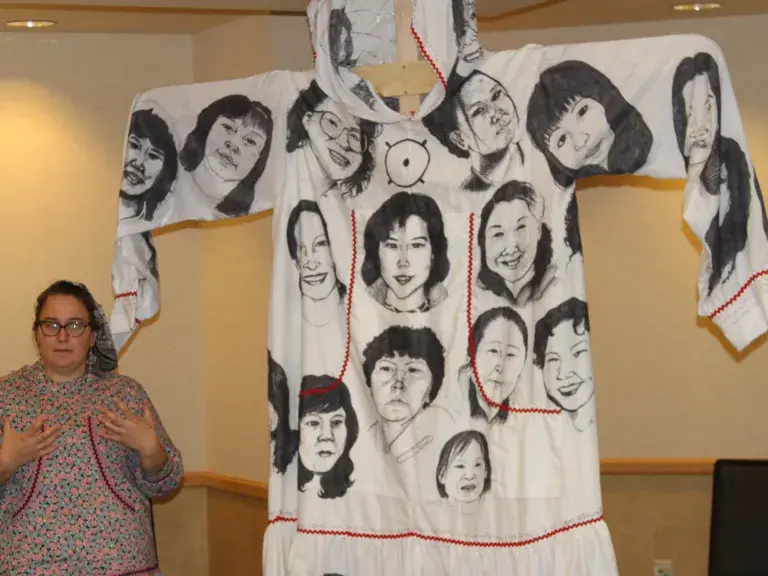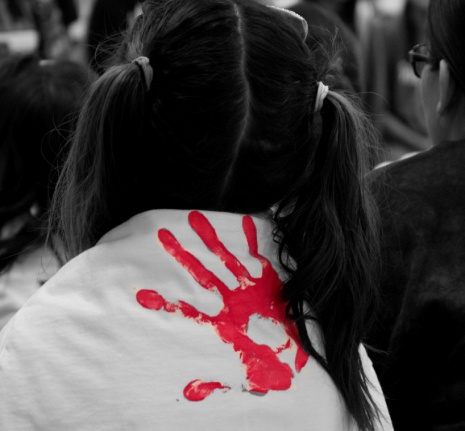
Detail of Qaspeq by Amber Webb
|
Donations to the Safe Women, Strong Nations project are being matched, up to a total of $25,000. Please consider making an additional or increased gift by January 15, 2020. |
OPERATION LADY JUSTICE: A FIRST STEP IN THE RIGHT DIRECTION FOR MISSING AND MURDERED INDIGENOUS WOMEN
President Trump surprised tribal communities and advocates late last month with Operation Lady Justice, an executive order establishing a federal task force on missing and murdered American Indian and Alaska Native people. The task force is a two-year initiative to examine and come up with a government-wide strategy to improve responses, cooperation, and awareness of missing and murdered Native people, especially women and girls (MMIW).
As the task force examines the issue over the next two years, the Department of Justice will take more immediate action to step up the government’s response to MMIW. The DOJ unveiled a three-part strategy that includes investing $1.5 million to hire coordinators in eleven states to establish common protocols for responding to reports and cases of MMIW. In addition, specialized FBI Rapid Deployment Teams will be available to assist tribal, state and local law enforcement on these cases. The DOJ will also analyze how to improve data collection on missing persons, something that is sure to inform the task force’s study and recommendations.
Most advocates and community leaders have welcomed the administration’s attention to MMIW, saying it’s a start and a step in the right direction. Even so, there are concerns, especially that the initiatives don’t or won’t reflect adequate input and leadership from tribes and tribal organizations.
It is certain that the success of these initiatives will depend on listening to and working with tribal leaders and those who have the deepest understanding and commitment to improving safety for Native women and children. But the critics who assert that the President and Republicans are trying to claim the MMIW issue and take it away from Democrats risk making violence against Native women and girls a partisan issue and having it become mired in the mud of these politically polarized times.
VAWA NEGOTIATIONS GRIND TO A HALT
That’s what’s happening now, as gun lobbyists and lawmakers in the Senate hold the reauthorization of the Violence Against Women Act hostage.
Reauthorizing VAWA should be a gimme for law makers. Legislation intended to protect and help heal victims of violence – it seems there should be little to argue over. It’s true that last time VAWA was renegotiated there were lawmakers who fought against adding protections for some of the country’s most vulnerable populations, including Native women. But Republicans and Democrats came together and passed VAWA bills by wide margins – nearly three-to-one in the Senate and two-to-one in the House.
That version of VAWA, signed into law by President Obama in 2013, has been due for reauthorization since 2018.
This past April, the U.S. House of Representatives passed a VAWA reauthorization bill – proposing a new and stronger version of the law. For Native communities, it would expand tribal criminal jurisdiction so local, tribal courts can respond to crimes committed by non-intimate partners, including child or elder abuse, sexual violence or rape by a stranger, and sex trafficking. It would create a pathway for tribes in Alaska to begin to use the same tribal provisions that tribes in the Lower 48 have had access to for 6 years. Thirty-three Republicans broke ranks to vote with 230 Democrats for the bill.
OPPOSING VAWA BILLS INTRODUCED IN THE SENATE
But negotiations on VAWA have ground to a halt in the Senate. A main sticking point has been closing the “boyfriend loophole,” a gap in the law that allows physically abusive boyfriends, or ex-boyfriends, to obtain and own a gun even if they've been convicted of intimate partner violence or stalking. The law already restricts gun ownership for those convicted of domestic assault or abuse - domestic being the operative word, as it applies to abusers who are or were married to, lived with, or had a child with their victim.
When the Senators failed to find a compromise, Senator Diane Feinstein (D-CA) introduced S.2843, which mirrors the VAWA bill passed by the House. All 47 Senate Democrats are co-sponsors of the bill.
Senator Joni Ernst (R-IA) introduced an opposing VAWA reauthorization bill, S.2920. While it is good to see someone new trying to take the lead on this issue, it is terribly disheartening to see Senator Ernst ignore the serious concerns that were raised in meetings with Native women, tribal leaders, and tribal organizations.
LEGISLATORS IGNORED INDIGENOUS VOICES; A BAD BILL FOLLOWED
Among other problems, Senator Ernst’s bill would impose severe and unwarranted burdens and restrictions on tribal courts, including authorizing periodic audits by the Attorney General. It would make it easier for non-Native defendants to move their cases from tribal to non-tribal courts, and it would leave tribes vulnerable to lawsuits by defendants in tribal courts by undermining tribal sovereign immunity. Senator Ernst’s bill would undo the progress made in VAWA 2013 and attack tribes’ inherent authority to protect their citizens from crime.
The bill threatens to take us back decades and undo a generation of work to rebuild our tribal nations and secure tribal sovereignty in order to improve safety for Native women.
As of this week, twelve of Senator Ernst’s Republican colleagues are cosponsoring her bill – a relatively leaden response. Hopefully Senate Republicans will heed their colleague Lisa Murkowski’s (R-AK) call for passing a bipartisan VAWA bill that "empowers our tribal governments and respects tribal sovereignty.”
“There is nothing partisan about making sure that Native women are protected," Senator Murkowski said during a Senate Indian Affairs Committee hearing. "We are dealing with vulnerable women here... The last thing in the world they want to do is get caught up in our partisan politics."
Well said, Senator Murkowski. Thank you.

